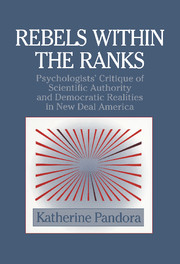 Rebels within the Ranks
Rebels within the Ranks Published online by Cambridge University Press: 06 October 2009
The disturbing fact is that any persistent and searching inquiry into the criteria of psychology as science leads inevitably to a discussion of the essential principles of science itself … We cannot afford to forget the ideal of empirical science embodied in the words of Isaac Newton, “In this philosophy, propositions are based on phenomena, and laws are derived by induction.”
Arthur Bills (1938)By the close of the 1930s, arbiters of the status quo had begun to mount worried defenses of scientific method that sought to rebut what they saw as the pernicious effect of oppositional sensibilities such as those expressed by Allport and the Murphys. Defenders of right thinking such as psychologist Arthur Bills believed that the ground that had been “won by the efforts of Galileo, Bacon, Newton and others” was imperiled by “newer psychological systems which are clamoring for scientific status with all the vigor and scorn for tradition that characterize youthful movements.” C. C. Pratt, in his 1939 text, The Logic of Modern Psychology, defended the reigning orthodoxy, stating that science was “too serious and well established a game to be entered into lightly or altered, unless it can be shown either that a proposed alteration does not upset the essential features of play, or that the new game is better than the old one.” This is why those who “played” science had “a right to insist that it be played according to rule.”
To save this book to your Kindle, first ensure [email protected] is added to your Approved Personal Document E-mail List under your Personal Document Settings on the Manage Your Content and Devices page of your Amazon account. Then enter the ‘name’ part of your Kindle email address below. Find out more about saving to your Kindle.
Note you can select to save to either the @free.kindle.com or @kindle.com variations. ‘@free.kindle.com’ emails are free but can only be saved to your device when it is connected to wi-fi. ‘@kindle.com’ emails can be delivered even when you are not connected to wi-fi, but note that service fees apply.
Find out more about the Kindle Personal Document Service.
To save content items to your account, please confirm that you agree to abide by our usage policies. If this is the first time you use this feature, you will be asked to authorise Cambridge Core to connect with your account. Find out more about saving content to Dropbox.
To save content items to your account, please confirm that you agree to abide by our usage policies. If this is the first time you use this feature, you will be asked to authorise Cambridge Core to connect with your account. Find out more about saving content to Google Drive.